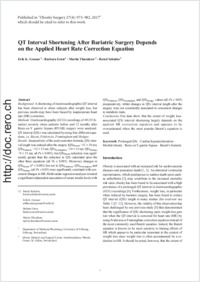QT interval shortening after bariatric surgery depends on the applied heart rate correction equation
- Grasser, Erik Konrad Department of Medicine/PhysiologyUniversity of Fribourg, Switzerland
- Ernst, Barbara eSwiss Medical and Surgical Center, Interdisciplinary Obesity Center, St. Gallen, Switzerland
- Thurnheer, Martin eSwiss Medical and Surgical Center, Interdisciplinary Obesity Center, St. Gallen, Switzerland
- Schultes, Bernd eSwiss Medical and Surgical Center, Interdisciplinary Obesity Center, St. Gallen, Switzerland
-
01.04.2017
Published in:
- Obesity Surgery. - 2017, vol. 27, no. 4, p. 973–982
English
A shortening of electrocardiographic QT interval has been observed in obese subjects after weight loss, but previous results may have been biased by inappropriate heart rate (HR) correction.Methods Electrocardiography (ECG) recordings of 49 (35 females) severely obese patients before and 12 months after Roux-en-Y gastric bypass (RYGB) surgery were analysed. QT interval (QTc) was calculated by using four different equations, i.e. Bazett, Fridericia, Framingham and Hodges.Results Irrespectively of the used correction formula, QTc interval length was reduced after the surgery (QTcBazett −31 ± 18 ms; QTcFridericia −12 ± 15 ms; QTcFramingham −14 ± 15 ms; QTcHodges −9 ± 15 ms; all Ps < 0.001), but QTcBazett reduction was significantly greater than the reduction in QTc calculated upon the other three equations (all Ps < 0.001). Moreover, changes in QTcBazett (P < 0.001) but not in QTcFridericia, QTcFramingham and QTcHodges (all Ps > 0.05) were significantly correlated with concurrent changes in HR. Multivariate regression analyses revealed a significant independent association of serum insulin levels with QTcFridericia, QTcFramingham and QTcHodges values (all Ps < 0.05) preoperatively, whilst changes in QTc interval length after the surgery were not consistently associated to concurrent changes in metabolic traits.Conclusions Our data show that the extent of weight loss-associated QTc interval shortening largely depends on the applied HR correction equation and appears to be overestimated when the most popular Bazett’s equation is used.
- Faculty
- Faculté des sciences et de médecine
- Department
- Département de Médecine
- Language
-
- English
- Classification
- Biological sciences
- License
- License undefined
- Identifiers
-
- RERO DOC 288950
- DOI 10.1007/s11695-016-2393-8
- Persistent URL
- https://folia.unifr.ch/unifr/documents/305630
Statistics
Document views: 62
File downloads:
- gra_qis.pdf: 209
